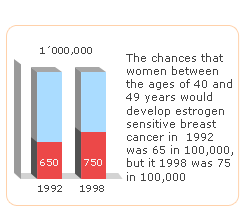In a recent research, Dr. Cho and her team of health professionals from the Department of Medicine, Brigham and Women's Hospital and Harvard Medical School concluded that daily intake of red meat might significantly increase a woman's risk of certain breast cancer, even before she reaches menopause.
Red Meat Ingestion during Premenopause and Breast Cancer

Researchers at Brigham and Women's Hospital (BWH), in which Dr. Cho led the investigation, studied the association between red meat ingestion and breast cancer in 90,659 women from 1991 through 2003 (when they had an average age of 36). It was necessary for the investigation that these women were premenopausal and had not previously had cancer to be included in this analysis.
The participants filled out food questionnaires in three times: 1991, 1995 and 1999 in order to give information about their diets and whether or not they developed breast cancer during that period.
On of the contribution of this investigation is that it let us know the chances that women, between the ages of 40 and 49 years, would develop estrogen-sensitive breast cancer in 1992 were 65 in 100,000, but it increased to 75 in 100,000 by 1998.
"The overall risk of premenopausal breast cancer is low when we compared to getting the disease after the menopause. So even at the highest rates of meat consumption, this is overall still a relatively small increase," says Henry Scowcroft at Cancer Research UK.
One of the hypotheses might be because women are consuming more foods that contain added hormones or hormone-like compounds than they used to in previous decades, Dr. Cho says.
The hormones or hormone-like compounds in red meat may promote the growth of hormone-sensitive breast cancer by attaching to specific hormone receptors on the tumours, Cho suggests.
On the other hand, researchers said the findings provide another motivation to limit consumption of red meat, which is already known to predispose the risk of colon cancer.
"So many risk factors for breast cancer are things that you can't alter," said Nancy E. Davidson, a breast cancer expert at Johns Hopkins University in Baltimore. "This represents something women could take charge of -- something you can change to prevent your risk."
Might Red Meat Increase My Risk for Suffering Breast Cancer?
Why red meat might increase the risk for breast cancer continues unknown, but previous research has suggested several possible reasons: substances produced by cooking meat may be carcinogenic, naturally occurring substances in meat may mimic the action of hormones, or growth hormones that farmers use to feed cows could fuel breast cancer in women who consume meat from the animals.
Besides that, when the researchers analyzed the data from 1991 to 2003, they found no overall link between red meat intake and an increased risk of breast cancer. But when they examined the data from only the 512 women who developed the type of breast cancer whose growth is fueled by the hormones estrogen and progesterone, they found an association.
Do I Have to Eradicate Read Meat Ingestion from My Regular Diet?
While it may be premature to make formal dietary recommendations based on the findings, it is so well respected that women should take this new analysis into consideration in order to avoid health troubles such as a different kind of cancer related with the daily read meat intake.
In this way, Cho recommends that since red meat also contains saturated fat, “it's prudent for women to reduce their red meat intake for health purposes in general”.